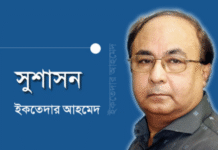Barrister Harun ur Rashid
BNP Chairperson Khaleda Zia a few years ago urged the President to take steps towards a consensus between the ruling and the opposition parties for holding a free, fair and participatory election under a non-party government. It is reported that the President said his constitutional powers were limited with regard to taking any such initiative. He assured that he would do his best within his powers for resolving the ongoing political crisis.
Briefing reporters after the meeting at the Bangabhaban, President’s Press Secretary said the President told the 18-party leaders that both sides – the Awami League and the BNP – would have to come forward to initiate dialogue.
President’s functions & power
“A solution will come if negotiations take place. A dialogue will bring good to the nation. But both sides have to take initiatives. I am not in a position to make such move. I have to protect and preserve the constitution … the democratic process must continue.” The above remark of the President is significant because the President’s powers were taken away by the 12th Constitutional Amendment. Thereafter the successive governments failed to restore the powers of the President so as to resolve a national political crisis. All executive powers in Bangladesh are vested in the Prime Minister under the constitution (Article 55.2) and not the cabinet which is responsible only to the parliament. The powers of the President have been spelt out in Article 48 (3) which reads as follows:
“In the exercise of all his functions, save only that of appointing the Prime Minister pursuant to clause (3) of Article 56 and the Chief Justice pursuant to clause (1) of Article 95, the President shall act in accordance with the advice of the Prime Minister.” In the aforesaid article, please note the word “shall” and not “may” has been used providing no scope for exercise of discretion of the President. Again in the appointment of Prime Minister the President is bound by clause (3) of article 56 which reads “The President shall appoint as Prime Minister the member of parliament who appears to him to command the support of the majority of the members of parliament.” Here also there is hardly any discretion left for the President.
The President of Bangladesh under the constitution cannot return the bill to the parliament for reconsideration while it appears he can sit on the bill or delay his assent to the bill giving discreet indication that the President is not pleased with the contents of the bill.
Constitutionality of election
Such action may however displease the Prime Minister and his job may be at risk. We have witnessed how President A.Q. M. Badruddoza Chowdhury fell into disfavor of the then Prime Minister and he had to resign on June 21 in 2002 after only seven months in the highest office.
Under Article 53 of the Indian Constitution, all “executive powers” (not functions) of the Union are vested in the President. These powers are exercised by him either directly or through subordinate officers in accordance with the Constitution, meaning the Prime Minister and the Cabinet.
When a bill has been passed by the parliament, the President of India can give his assent to the bill or withhold his assent to the bill or return the bill (if it is not a Money Bill or a Constitutional Amendment Bill) for reconsideration of the Parliament. The President of Bangladesh, when elected by the parliament, resigns from the political party and he becomes a non-partisan person. The President is the head of the state and the Prime Minister is the head of the government – one of its three organs of the state, the other two, being the parliament and the judiciary. The head of the state also symbolizes the wishes and aspirations of the people of Bangladesh. He is the moral guardian of the constitution and not only its letters but also its spirit.
Article 7 (1) of the constitution stipulates that all powers in the Republic belong to the people and if a large section of people affiliated to a major political party boycotts the parliamentary election, it could be argued that such election does not reflect the powers of all people and hence may seem to be contrary to provision of the constitution.
President’s moral authority
This being so, it may be argued that the President, the guardian of the constitution which under 7(2) is the “solemn expression of the will of the people” may intervene to give expression to the will of the people. Furthermore under Article 45 (5) the President may request the Prime Minister to refer the matter raised by the opposition parties for the consideration of the cabinet. If the violent political confrontation continues, the lives of the people of the country will be at a grave risk, besides the image of Bangladesh in international community. Bangladesh has earned good reputation in keeping peace by sending its personnel in the conflict-zones around the world under the UN and it will be an irony if peace does not exist in Bangladesh itself. Furthermore the economy will be ruined because there is no investment from domestic or foreign investors. The people suffer because the politicians fight among themselves for powers and privileges. It is like when two elephants fight, it is the grass that gets trampled.
It is not the formal authority but moral authority which counts. The President can exercise his moral authority from his exalted position and the people look up to him to address the national crisis.
Source; Weekly Holiday









